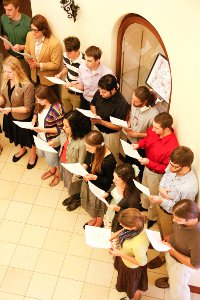- Home
-
About
 Fidelity & Excellence
Fidelity & ExcellenceThomas Aquinas College is unique among American colleges and universities, offering a faithfully Catholic education comprised entirely of the Great Books and classroom discussions.
-
A Liberating Education
 Truth Matters
Truth MattersTruth, and nothing less, sets men free; and because truth is both natural and supernatural, the College’s curriculum aims at both natural and divine wisdom.
-
A Catholic Life
 Under the Light of Faith
Under the Light of FaithThe intellectual tradition and moral teachings of the Catholic Church infuse the whole life of Thomas Aquinas College, illuminating the curriculum and the community alike.
-
Admission & Aid
 Is TAC Right for You?
Is TAC Right for You?Do you enjoy grappling with complex questions? Are you willing to engage in discussions about difficult concepts, with the truth as your ultimate goal?
-
Students & Parents
 Mind, Body & Spirit
Mind, Body & SpiritThere is always something to do at TAC — something worthwhile, something fulfilling, and something geared toward ever-greater spiritual and intellectual growth.
-
Alumni & Careers
 What Can You Do with a Liberal Education?
What Can You Do with a Liberal Education?Nothing speaks more to the versatility of the College’s academic program than the good that our alumni are doing throughout the Church and the world.
- Search
- Giving
Audio: Junior Class Music Tutorial, Fall 2012
During the last days of classes before final examinations, 35 Thomas Aquinas College juniors gathered in the rotunda of St. Thomas Hall to sing four hymns. The brief performance marked the latest chapter in a young but increasingly anticipated campus tradition.
The emphasis on singing, with the public performance at the end of the semester, is a new phenomenon, the inspiration of Dr. Phillip Wodzinski, a tutor on the College’s teaching faculty. After his first semester teaching the tutorial in the fall 2010, Dr. Wodzinski was eager to showcase his students’ achievements; so he arranged for the mid-afternoon performance in the College’s faculty and administration building — surprising and delighting passersby.
Below are audio clips of the juniors’ four end-of-the-year hymns, accompanied by Dr. Wodzinski’s description of each one. (Note: To download a clip, click on the down arrow in the audio player.)
“Come Let Us Sing Our Cheerful Songs”
1. The words of this song, by the great Isaac Watts (1674-1748), reflect the praise of God by angels and men. The cheerful music is a G-major tune called “Rodmell,” an English folk tune (originally for the song, “The Bailiff’s Daughter”) collected and harmonized by Ralph Vaughan Williams in 1906.
“Eternal Ruler of the Ceaseless Round”
2. This hymn takes us from the cheerful to the stately, using “Song 1,” a slow melody by Orlando Gibbons (1583-1625), originally composed for George Wither’s hymn, “Now Shall the Praises of the Lord be Sung.” The harmony, as arranged by Vaughan Williams for four parts rather than the original two, is symmetrical: It starts in F-major, goes to C-major, to B-flat-major, back to F-major, and reverses direction from B-flat to C back again to F. The lyrics to “Eternal Ruler,” with their ancient cosmology and biblical language, might seem to have come from a medieval monk, but were written by John White Chadwick (1840-1904), an American Unitarian.
“O God of Earth and Altar”
3. The third hymn’s lyrics by G.K. Chesterton (except for the line about “prince and priest and thrall”) well apply to 2012 America. The dramatic music again comes from Vaughan Williams’ exploration of the English folk tradition. The tune, “Kings Lynn,” he collected from the folk song “Young Henry the Poacher,” and harmonized. It begins and ends in d-minor, but spends a great deal of time in F-major (with a quick breath at what seems to be a-minor). The key is not very clear, however: When d-minor seems the key, F-major chords are in plenitude, and the F-major parts are so affected by the d-minor context that they also sound almost minor. The hymn was arranged for unison singing, with the harmony left to the organ. Instead of singing it as intended, and thus losing the harmony, the altos, tenors, and basses here sing the organ part. This one might sound a little strange! It might or might not be worth noting that Iron Maiden, a heavy metal band, recorded a version of this in the mid-1980s …
“Faith of Our Fathers Taught of Old”
4. With the fourth hymn we move from the awesome and strange to the awesome and militant. If “Come Let Us Join Our Cheerful Songs” paints a picture of the eternal angelic praise, if “Eternal Ruler of the Ceaseless Round” is invocation of God by mortal men on earth, and if “O God of Earth and Altar” is begging for God’s help, “Faith of Our Fathers Taught of Old” is the summoning of His servants to do their part. The music is “Genevan Psalm 68,” from the Genevan Psalter by Matthaeus Greiter (1495-1550). Greiter left the Catholic faith for Lutheranism but reverted prior to his death; the subsequent use of his tune mirrors the “ecumenical” character of his life: meant for the Lutheran church, it was adopted as a Calvinist hymn, and later adapted by the Anglicans; now it’s being sung in a Catholic college. The rousing music is accompanied by fighting words, written by Thomas Lacey at the beginning of the 20th century. If we are to take Dr. McLean’s advice not to “let ourselves be discouraged or deterred by the challenges we face from an aggressively secular culture,” we would do well to keep in mind and heart hymns like this one.




